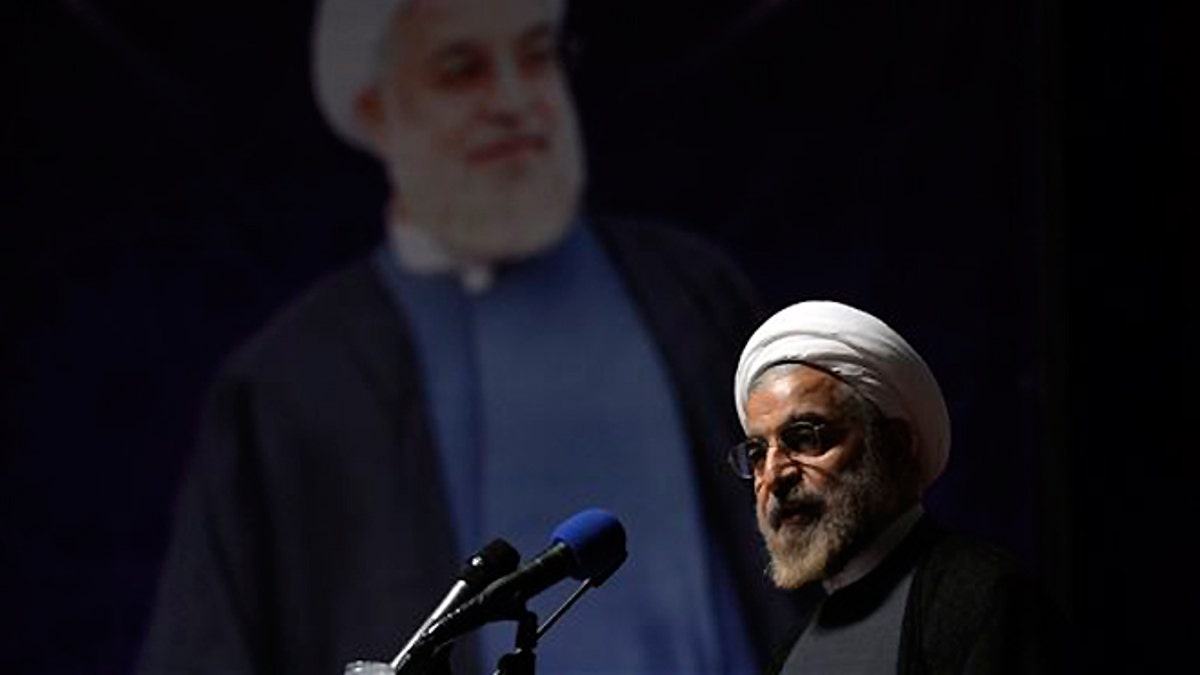
FILE -- May 2, 2013: Iranian President Hasan Rouhani delivers a speech during his campaign for the presidential election in Tehran, Iran. The U.N. has slotted the new moderate-leaning president to address the global gathering of leaders on Sept. 24 -- just hours after U.S. President Barack Obama is scheduled to wrap up his speech. (AP/Vahid Salemi)
Courtesy of the United Nations, and the ONE U.N. New York hotel, the Iranian diplomatic assault team will hit New York City early next week.
We know one thing about this offensive already. The standing of President Obama on the world stage, in the wake of his Syria fiasco, is going to go from very bad to much worse.
This will be Iranian President Hassan Rouhani’s debut at the UN General Assembly. Obama and Rouhani will both address the Assembly on opening day, September 24, 2013. As president of the host country, Obama will go first.
With the world’s media camped outside U.N. Headquarters, the moment is a unique opportunity to speak to the global village.
By Tuesday, it will have been 3,737 days since the UN’s own International Atomic Energy Agency first reported that Tehran had failed to comply with its obligations under the Nuclear Non-Proliferation Treaty.
[pullquote]
Iran is the leading state sponsor of terrorism, on the verge of acquiring the world’s most dangerous weapon, and the single greatest threat to the national security of the United States.
In theory, President Obama could play it straight – instead of getting played.
He could challenge Rouhani’s bona fides directly.
He could point to the sham Iranian election in which 686 candidates registered, eight were approved, and every woman disqualified.
He could describe the horrific human rights abuses suffered by Iranians today, detail the nuclear centrifuges still spinning their way to weapons of mass destruction under its new president, and spell out Rouhani’s hand in training Syrian President Assad’s murderous thugs.
But he will not. President Obama will mount the podium and demonstrate that the past is prologue.
Here’s President Obama at the General Assembly in 2009: “I am committed to diplomacy that opens a path to greater prosperity and a more secure peace for [Iran] if…[it] lives up to [its] obligations.”
In 2010: “The United States… seek[s] a resolution to our differences with Iran, and the door remains open to diplomacy should Iran choose to walk through it.”
In 2011: “There's a future of greater opportunity for the people…if the…[Iranian] government meet[s its] international obligations.” In 2012: “America wants to resolve this issue through diplomacy, and we believe that there is still time and space to do so. But that time is not unlimited.”
As an added bonus, President Obama’s U.N. cue cards routinely include “international law is not an empty promise” and a non-compliant Iran will be held “accountable.”
Despite the repetition, however, the speechifying has not been easy-going.
In 2009, the President and Secretary Clinton had to divert our attention from Iranian democracy-seekers dying in the streets of Tehran while begging for U.S. support.
Then there were Ahmadinejad’s inconvenient recurring rants, espousing genocide, denying the Holocaust, and suggesting 9/11 was an inside job.
All Rouhani has to do is to appear slightly more polished, and the White House will embrace him as another one of those “lifelines” an adversary just happen to toss Obama’s way.
The endgame for Rouhani’s U.N. performance is simple: buy time. There is every indication that Obama is prepared to sell.
U.N. Ambassador Samantha Power said on September 5, 2013: “the United States hopes that the inauguration of President Rouhani creates an opportunity for Iran to act quickly to resolve the international community’s serious concerns about Iran’s nuclear intentions…” Evidently, she is oblivious to the fact that Iran’s intentions are to acquire nuclear weapons.
All the president wants, pleaded Power, is a sign. She said: “We would welcome a constructive sign that Iran may be prepared to engage substantively and seriously with the international community. If Iran chooses to do so, then it will find a willing partner in the United States.”
President Obama himself addressed the nation on September 10, 2013 with these words: “Iran must decide whether to ignore international law by building a nuclear weapon, or to take a more peaceful path” – willfully blind to the reality that Iran has decided – to build a bomb.
And that’s not all. Before Syria vividly exposed the pathology of Obama’s UN engagement syndrome, it must have seemed to the White House like a good idea to have the UN host a “high-level meeting on nuclear disarmament” during 2013’s opening days.
Now nuclear proliferator Rouhani will speak a second time on September 26, 2013.
The subject? The elimination of nuclear weapons.
The script? Israel and the United States must walk the plank first.
Speaking in Jerusalem on September 15, 2013, Secretary Kerry made another unscripted statement that President Obama was quickly forced to realign with his foreign policy. Said Kerry: “We cannot have hollow words in the conduct of international affairs.” To which the president replied: Yes, we can.
